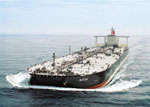 Reuters: Iran’s oil shipping operator NITC is expanding its oil tanker fleet with the first of 12 supertankers to be delivered from China in May, fortuitous timing for the OPEC member as Western sanctions force Tehran to rely more on its ships to export oil. By Chen Aizhu
Reuters: Iran’s oil shipping operator NITC is expanding its oil tanker fleet with the first of 12 supertankers to be delivered from China in May, fortuitous timing for the OPEC member as Western sanctions force Tehran to rely more on its ships to export oil. By Chen Aizhu
 BEIJING (Reuters) – Iran’s oil shipping operator NITC is expanding its oil tanker fleet with the first of 12 supertankers to be delivered from China in May, fortuitous timing for the OPEC member as Western sanctions force Tehran to rely more on its ships to export oil.
BEIJING (Reuters) – Iran’s oil shipping operator NITC is expanding its oil tanker fleet with the first of 12 supertankers to be delivered from China in May, fortuitous timing for the OPEC member as Western sanctions force Tehran to rely more on its ships to export oil.
The new tankers, each capable of carrying 2 million barrels of crude, add much-needed capacity to NITC’s fleet at a time when the number of maritime firms willing to transport Iranian crude has dwindled significantly amid European sanctions.
The EU will prohibit European insurers and reinsurers from indemnifying tankers carrying Iranian crude oil anywhere in the world from July, threatening to curtail shipments and raise costs for major buyers like China, India, Japan and Korea.
Asian oil importers are lobbying European officials, who are expected to meet on the issue in mid-May, for exemptions to the sanctions.
“These new tankers now carry more weight in this sanction environment,” said a Beijing-based oil executive with knowledge of these ships, adding that the first tanker with a capacity of 318,000 deadweight tonnes is named “Safe”.
Another seven very large crude carriers (VLCCs) are scheduled for delivery by the end of this year from two Chinese shipyards, and the remaining four are expected to be commissioned by the end of 2013 as part of a total contract worth $1.2 billion, industry executives told Reuters.
A second executive, with direct knowledge of the delivery programme, said the Western sanctions have not impacted the shipbuilding contract with Iran as payments from NITC so far have been received without much problem, though the full payment was not due yet.
With a fleet of 39 oil tankers, NITC currently does not have the capacity by itself to ship all of Iran’s crude exports of 2.6 million barrels per day, and must either charter more ships or leave it to importers to hire their own vessels.
Running at full capacity, without any delays or maintenance, NITC’s current fleet has the capacity to ship half of Iran’s crude exports to Asia, assuming a 46-day round-trip voyage between Iran and China, according to Reuters calculations.
The shipping firm would roughly need to add an extra 17 supertankers above the 12 it has on order to have the capacity to ship all of Iran’s crude to Asia.
LOSING INSURANCE
Most oil tankers operated by Chinese and Indian shipping companies were covered by European insurers. The firms will need to find replacement insurance if they want to continue to use their vessels to carry Iranian oil after sanctions take effect.
Japanese ship owners operating in Iran will see their tanker coverage reduced to a fraction of what it is now and will be severely limited by how many trips each vessel can take to the Middle East country.
Although Japan’s insurers do not directly fall under the sanctions regime, they are dependent on the European reinsurance market to hedge their risk.
India, Japan and other top Iran oil buyers are hoping their governments will step in and provide sovereign guarantees to allow Asian insurers to replace lost European coverage.
“Right now, there is no clarity as to how we will get shipments from July 1,” said U.K. Basu, managing director of India’s Mangalore Refinery and Petrochemicals Ltd.
“It is a national issue and I expect some solution should be found out quickly.”
Another option to keep the flow of Iranian oil to Asia would be for the OPEC member to provide the maritime insurance for shipments or use NITC’s tankers.
NITC ordered the 12 vessels to be built at Waigaoqiao Shipbuilding Co Ltd, a China CSSC Holdings Ltd unit based in financial hub Shanghai, and Dalian Shipbuilding Industry Co. Ltd, based in the northeastern port of Dalian.
Each builder won an order for six vessels, with the total order financed mostly by China’s Export and Import Bank, officials said, a policy bank that funds China’s massive trade business and Chinese firms’ overseas investment.
The Iranian firm has by now settled more than two-thirds of the $600 million bill with at least one of the two shipyards, said the second executive, who declined to be named due to the sensitivity of the matter.
(Additional reporting by Nidhi Verma in New Delhi, Writing by Randy Fabi; Editing by Himani Sarkar and Ed Davies)


